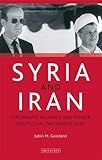As a follow-up to yesterday's blog post, I wanted to add some additional thoughts, as well as mentioning a few additional news items that crossed my radar.
Several other news sources have cited hints of Iran's internal discontent over Assad's use of chemical weapons. In particular, Iranwire posted some very interesting interviews with the various Iranians on the topic of Syrian chemical weapons and US intervention.
In spite of all this, let me be perfectly clear: I'm not suggesting that what I proposed yesterday would be easy. In spite of Iran's deep opposition to the use of chemical weapons, the loss of the Assad regime would be a major strategic blow to their standing in the Middle East. Iran has a long history of close relations with Syria, particularly post-1979 revolution, when Syria was one of the only countries in the Middle East to wholeheartedly support the removal of the Shah. Furthermore, Syria’s support during the Iran/Iraq war was vital to Iran's survival against Saddam Hussein’s assault. If Iran participated in the removal of Bashar Assad they would essentially be stabbing a longtime ally in the back.

For more information on the deep and complex relationship between Syria and Iran I highly recommend "Syria and Iran" by Jubin Goodarzi. It's extremely detailed and very dense, but quite rewarding.
Additionally, there would certainly be resistance to this idea within Saudi Arabia, the US, and among many of the Syrian rebel groups. If Iran is involved in the process of removing Assad, establishing a cease-fire, and restructuring an interim governmental authority there is the very real possibility that they could retain much of their deep organizational influence in a post-Assad Syria (indeed, they are unlikely to participate if this is not the case). Saudi Arabia, in particular, has been spending huge amounts of money to support many of the different rebel factions, and will not take kindly to anything less than a maximum return on that investment. Also, anti-Iranian sentiment is strong among many of the Syrian rebel groups, no small part due to the active presence and ruthless brutality of the IRGC Quds Force soldiers who have been training, coordinating, and leading Syrian forces in their fight against the rebels.
Persuading Iran to participate in the negotiated removal of Assad and his inner circle will also take more than simply presenting convincing evidence of the regimes culpability in the use of chemical weapons, it will also be crucial that the US establish its own credibility on this issue. If the White House wants to be taken seriously on the unacceptability of chemical weapons it should make a formal apology for US involvement in the Iraqi use of chemical weapons against Iran. Interestingly enough, last week released CIA files finally acknowledged what everyone has known for decades: the United States was complicit in facilitating Saddam Hussein's use of chemical weapons.
Given that this has been publicly acknowledged, it seems like a relatively small step for the US to issue a formal apology, which would do nothing but help our case against Assad and his chemical weapons usage. Furthermore, an apology of this nature would also strengthen the credibility of the US position against potential Iranian development of nuclear weapons capacity.
In related news, it looks like even the suggestion of US strikes has inspired a recent wave of regime defections, including some very high-profile individuals.
Also worth noting is Russia's shift to a “payment-up-front” system for major Syrian arms purchases, which suggests that they are not particularly confident in the Assad’s staying-power or ability to pay its bills on a long-term basis.